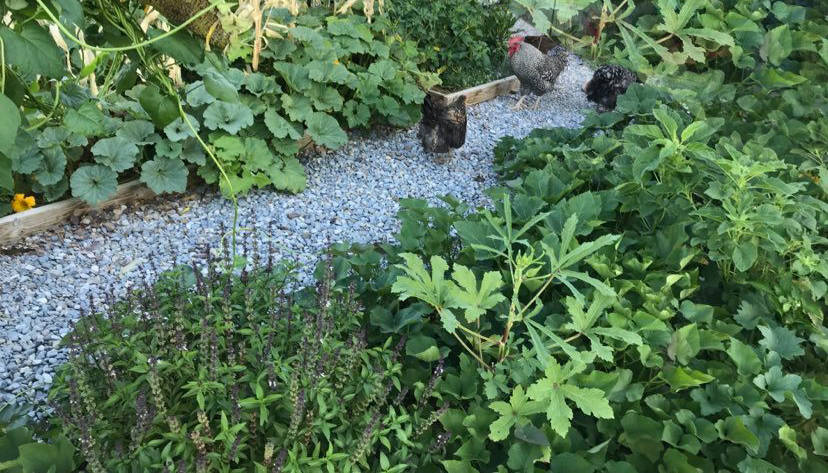
The idea of strolling through the garden on a glorious spring day followed by a flock of beautiful full-feathered laying hens just sounds so romantic, doesn’t it? I often hear from friends considering the virtues of country life, how they would love to have a garden complete with chickens to take care of the weeds.
Sadly, the end result of unsupervised chickens in the garden would be destruction of your hard work and many plants. With the proper infrastructure, however, chickens can be very useful garden helpers.
The benefits of chickens in a garden:
Chickens love to dig and scratch, which is a problem during gardening season, but once winter comes, let them till the soil to their heart’s content. Before letting your chickens into the garden, place your fallen leaves and other garden refuse over the surface of your soil. As the chickens scratch around, they’ll help the leaves to break down and incorporate them into your soil.
This process will leave your garden a bit of a mess and you will have to put your raised beds or rows back together before planting again, but you will have much less pest problems the next season. Chickens are very good at finding grubs, caterpillars, and other bugs that overwinter in the soil.
While the chickens are tilling the soil, they’ll also be leaving behind their manure, which is high in nitrogen. While you don’t want to plant in fresh chicken manure, after a few months it will break down and by spring your soil will be ready to feed your plants.
Another method that you can use is to fence off your garden in sections with the chicken paddock in the middle. Rotate your growing through the different fenced-off sections. This is an ideal setup when you are succession growing. As one fenced area finishes production, chickens can be allowed into that area while the others are left undisturbed.
Keeping garden safe from chickens:
There really is no substitute for fencing when it comes to chickens. The fencing should be at least 6 feet high. Though most breeds of domestic chickens cannot fly, they can jump fairly high. The fencing should also be hard to perch on. Chain link or poultry mesh fencing is more of a deterrent than a brick wall.
If fencing is not a possibility for you, there are plant cages that can be built out of wire poultry mesh. This method works best in raised beds. This type of cage is lightweight and easy to remove when working in your garden.
To make a cage, cut wire mesh 2 inches longer than length of the total area of the raised bed. Bend the wire to form the same shape as your raised bed. At this point, fasten the two ends together and cut more wire mesh the same length and width of your raised bed for a top. Fasten the top to the rest of the cage. To keep it from blowing away on windy days, stake it into the soil with tent pegs.
Put your chickens to work:
Once your garden plantings are several feet high, your chickens will welcome supervised access to the garden. I make it part of my morning routine and let them into the garden while I’m tending to it, keeping an eye on them to make sure that their digging doesn’t get too out of hand.
My chickens love to eat the nefarious tomato hornworm and follow me, waiting for me to toss one to them. They also find bugs on their own and eat small weeds that pop up here and there. When it is time to leave the garden, I find it easy to shoo them out the garden gate back into their own area. A small blast with the garden hose will send the stubborn lingerers running.
While the romantic notions of free-range hens lollygagging in a garden are not realistic, with proper care they can provide a wealth of benefits to any garden or orchard. They also make for great entertainment with the side benefit of fresh eggs.
Terri Meehan is the Founder of Southern Nevada Gardening Association a regional group. She is a garden mentor and local farmer in Pahrump. Send questions or comments to her at sonvgarden@gmail.com